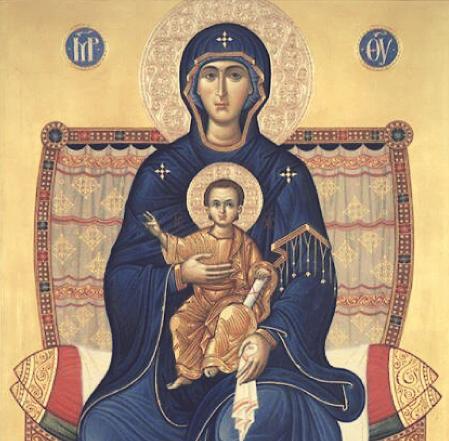
The Immaculate Conception
According to Pius IX (1854), “From the very beginning, and before time began, the eternal Father chose and prepared for his only-begotten Son a Mother in whom the Son of God would become incarnate and from whom, in the blessed fullness of time, he would be born into this world. Above all creatures did God so love her that truly in her was the Father well-pleased with singular delight. Therefore, far above all the angels and all the saints, so wondrously did God endow her with the abundance of all heavenly gifts poured from the treasury of his divinity that this mother, ever absolutely free of all stain of sin, all fair and perfect, would possess that fullness of holy innocence and sanctity than which, under God, one cannot even imagine anything greater and which, outside of God, no mind can succeed in comprehending fully.
“It was wholly fitting that so wonderful a mother should be ever-resplendent with the glory of most sublime holiness and so completely free from all taint of original sin that she would triumph utterly over the ancient serpent. To her did the Father will to give his only-begotten Son — the Son who, equal to the Father and begotten by Him, the Father loves from His Heart — and to give this Son in such a way that He would be the one and the same common Son of God the Father and of the Blessed Virgin Mary. It was she whom the Son Himself chose to make His Mother and it was from her that the Holy Spirit willed and brought it about that He should be conceived and born from whom He Himself proceeds” (Apostolic Constitution Ineffabilis Deus, para. 1-2).
This is the dogma of the Immaculate Conception in the Catholic Church, a dogma also held originally by the Fathers of the Orthodox Church, the Byzantine Fathers.
The Virgin Mary
As shown, the Virgin Mary is deified, was deified at the instance of her conception, and has always been deified. In other words, Mary was granted the grace of perpetual deification by the Holy Trinity, in addition to the graces of immaculate conception and perpetual virginity, otherwise she would not have been worthy of being the Theotokos; the bearer of the sinless Word. The Eternal Father, the First Person of the Trinity, proclaimed Mary’s deification to the heavens at the commencement of time when He told Satan, who had possessed the serpent to entice Adam and Eve to sin: “I will put enmity between you and the Woman, and between your seed and her seed. They shall bruise your head and you will bruise their heel” (Gn 3:15). If Mary had not been deified, she would have been unable to remain victorious over the Evil One throughout her entire life in relation to sin, because after Eve had disobeyed God (Gn 3:6), she lost that state of deification with which she was originally created and that would have been confirmed in her and in her offspring had she not sinned.
Jesus Christ, the Second Person of the Trinity, attested publicly to the Virgin’s perpetual deification during the wedding at Cana when He explicitly addressed Mary with the Father’s preferred term, after she had asked Him to take care of the issue with the wine: “Woman, what is that to Me and to you?” (Jn 2:4). Woman. The woman who not only had been proclaimed deified by the Father (Gn 3:15), but who was also proclaimed thus by the Spirit, the Third Person of the Trinity, through the Apostle John: “And a great sign appeared in heaven. A Woman clothed with the sun and the moon under her feet, and on her head a crown of twelve stars” (Rv 12:1). The Archangel Gabriel further attested to Mary’s perpetual deification at the Annunciation when he addressed her as “full of grace” (Lk 1:28).
The Virgin Mary is the epitome of deification (Palamas, 2005), a god by grace (Jn 10:34) though not God, as she has always been the incorrupt partaker of the divine nature (2 P 1:4). This because deification is “God’s perfect and full penetration of man” (Staniloae, 2002, p. 362), with “all who share in this [being] referred to as deified . . . above nature and virtue and knowledge . . . [as] this grace effects this ineffable union” (Gregory Palamas, 1338/1982).

